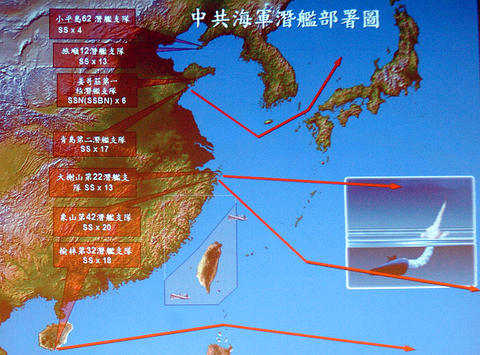Taiwan must upgrade and expand its submarine warfare capabilities if it is to prevent China, which will have its first aircraft carrier battle group by 2020, from surrounding the island from the east with its blue-water navy in the future, a high-ranking defense official said.
Chen Yung-kang (陳永康), director of the Ministry of Defense's Integrated Assessment Office, said the group would consist of 11 warships, with the recently acquired Varyag aircraft carrier and a Kiev-class helicopter carrier -- both Soviet-era vessels -- serving as its centerpiece.
Seven surface ships and two nuclear attack submarines will make up the remaining nine vessels, Chen said.

Chen made the remarks at a symposium yesterday morning, which was hosted by the Institute for Taiwan Defense and Strategic Studies to discuss the navy's planned purchase of eight submarines from the US.
Vice Admiral Tung Hsiang-lung (董翔龍), chief of staff of the Navy Command Headquarters, said that the US government has requested a down payment of US$360 million as a guarantee for the deal, given that Taiwan's opposition has continuously blocked the budget for the purchase of the submarines in the legislature.
"[The US government's] attitude is quite clear," Tung said. "If we do not give a down payment, they will not begin to hire European contractors to build the vessels for us."
The US government has to hire European contractors to build the eight diesel submarines for Taiwan since the US does not build diesel submarines anymore.
"After making the down payment and deciding on the European contractors, we will ask for blueprints of the vessels before they begin to build the submarines for us. When the blueprints are approved, we will then submit them to the legislature for a final approval," Tung said.
While the navy is willing to fork out US$360 million, Tung said it would not pay the US anything more unless it received assurance that what the US is selling is what the navy really needs, Tung said.
The navy's acquiescence to the down payment has been criticized by the opposition and some mem-bers of the public as extortion by the US.
"But, [the down payment] is not a form of extortion. The down payment is actually a show of our determination and guarantee to the US and potential European contractors that Taiwan will definitely carry out the contract. It also shows our determination to defend ourselves," Tung said.
Chu Tsung-jung (
Additional reporting by Hsu Chao-hsuan

AIR SUPPORT: The Ministry of National Defense thanked the US for the delivery, adding that it was an indicator of the White House’s commitment to the Taiwan Relations Act Deputy Minister of National Defense Po Horng-huei (柏鴻輝) and Representative to the US Alexander Yui on Friday attended a delivery ceremony for the first of Taiwan’s long-awaited 66 F-16C/D Block 70 jets at a Lockheed Martin Corp factory in Greenville, South Carolina. “We are so proud to be the global home of the F-16 and to support Taiwan’s air defense capabilities,” US Representative William Timmons wrote on X, alongside a photograph of Taiwanese and US officials at the event. The F-16C/D Block 70 jets Taiwan ordered have the same capabilities as aircraft that had been upgraded to F-16Vs. The batch of Lockheed Martin

GRIDLOCK: The National Fire Agency’s Special Search and Rescue team is on standby to travel to the countries to help out with the rescue effort A powerful earthquake rocked Myanmar and neighboring Thailand yesterday, killing at least three people in Bangkok and burying dozens when a high-rise building under construction collapsed. Footage shared on social media from Myanmar’s second-largest city showed widespread destruction, raising fears that many were trapped under the rubble or killed. The magnitude 7.7 earthquake, with an epicenter near Mandalay in Myanmar, struck at midday and was followed by a strong magnitude 6.4 aftershock. The extent of death, injury and destruction — especially in Myanmar, which is embroiled in a civil war and where information is tightly controlled at the best of times —

Taiwan was ranked the fourth-safest country in the world with a score of 82.9, trailing only Andorra, the United Arab Emirates and Qatar in Numbeo’s Safety Index by Country report. Taiwan’s score improved by 0.1 points compared with last year’s mid-year report, which had Taiwan fourth with a score of 82.8. However, both scores were lower than in last year’s first review, when Taiwan scored 83.3, and are a long way from when Taiwan was named the second-safest country in the world in 2021, scoring 84.8. Taiwan ranked higher than Singapore in ninth with a score of 77.4 and Japan in 10th with

SECURITY RISK: If there is a conflict between China and Taiwan, ‘there would likely be significant consequences to global economic and security interests,’ it said China remains the top military and cyber threat to the US and continues to make progress on capabilities to seize Taiwan, a report by US intelligence agencies said on Tuesday. The report provides an overview of the “collective insights” of top US intelligence agencies about the security threats to the US posed by foreign nations and criminal organizations. In its Annual Threat Assessment, the agencies divided threats facing the US into two broad categories, “nonstate transnational criminals and terrorists” and “major state actors,” with China, Russia, Iran and North Korea named. Of those countries, “China presents the most comprehensive and robust military threat